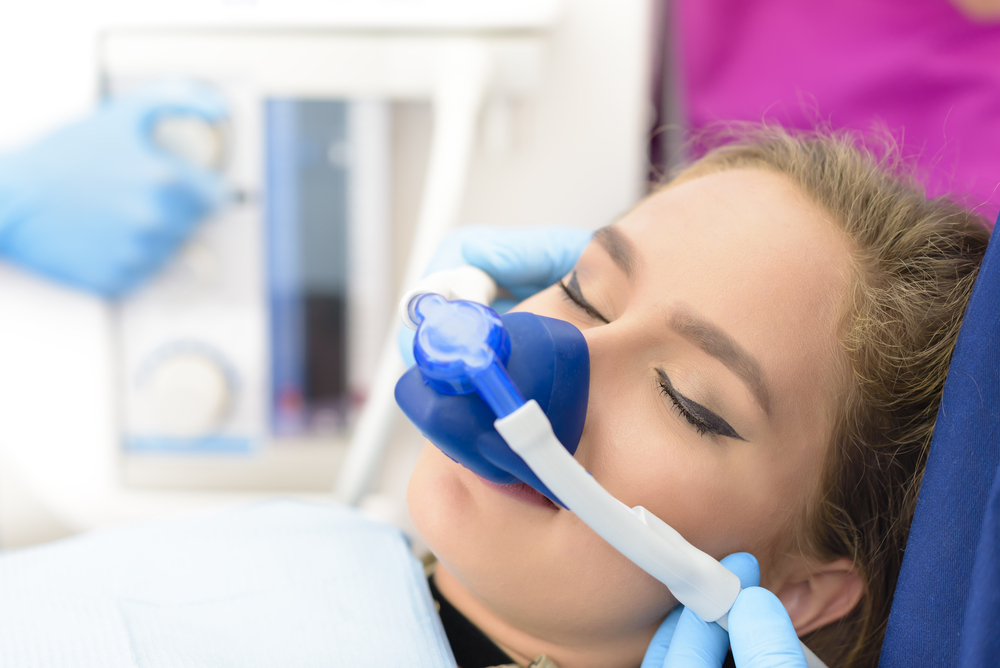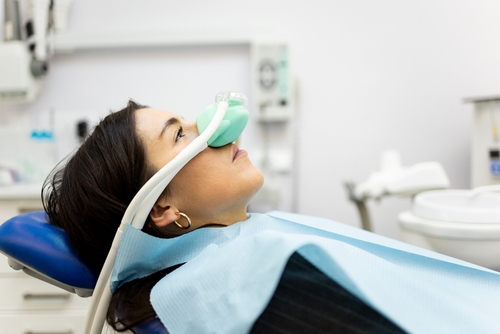Anxiety about the dentist can get in the way of preventive dental care and optimal oral health. Read on to discover practical and effective tips for easing anxiety at the dentist.
What Is Dental Anxiety?
Dental anxiety is when you associate an upcoming dental appointment with negative feelings. The negative feeling could be uneasiness, worry, panic, terror, nervousness, or another form of fear. When anxiety about the dentist is severe, it's referred to as dental phobia. People with dental anxiety or phobia typically go through the following:
- Insomnia caused by the thought of an upcoming dental appointment.
- Feeling physically or emotionally ill at the thought of going to the dentist.
- Experiencing distressing symptoms like heart palpitations, crying, extreme sweating, lightheadedness, or aggressive behaviour that intensifies.
- Extreme reluctance to enter the dentist's office once you get to the waiting room.
- General or irrational fear that prevents you from visiting or seeing the dentist.
What Causes Anxiety About the Dentist?
Fear is the primary emotion behind dental phobia. However, dental phobia comes in many shades and can stem from various causes.
- Fear triggered by past experiences. A painful or unpleasant experience in your childhood can trigger lifelong anxiety at the dentist. You can also get triggered by hearing horror stories from others, resulting in fear of pain and mistrust of dentists.
- Fear of dental tools. Dentists use various tools, such as needles, drills, and suction devices that may be intimidating if you're not familiar with them.
- Fear of side effects. Some people are afraid of the potential side effects of anaesthesia.
- Fear of anaesthesia not working. Others are worried that the anaesthesia won't work to prevent pain during the dental procedure.
- Fear of loss of control. It's common for people to feel helpless when reclined in a dentist's chair with their personal space invaded and without being able to see what's happening during the procedure.
- Fear of embarrassment. Many people feel self-conscious about having their teeth examined and are worried about bad breath and being judged on the state of their oral health.
- Generalised fear. Your fear might not have any specific cause, yet it can still prevent you from getting the dental care you need.
Is It Normal to Experience Anxiety About the Dentist?
Dental phobia is a real condition, and it affects many people worldwide. If you have been dealing with anxiety about the dentist, you're not alone. It's normal to experience dental fear and anxiety. The good news is you can learn to cope with and overcome dental anxiety like others in your shoes. This empowers you to take charge of your oral health.

Managing Your Anxiety at the Dentist – Top Tips
You don't have to let anxiety about the dentist get in the way of your perfect smile. Here's how to manage dental phobia in ways that have worked for others.
1. Discuss Your Dental Phobias With Your Dentist
One of the most crucial steps you can take toward conquering anxiety at the dentist is to be willing to discuss your fears. Once you open up, your dentist can create a more comfortable experience for you in the following ways:
- Answer your questions honestly and satisfactorily to help you mentally prepare.
- Provide suggestions on coping strategies.
- Assure you that your concerns are valid and will be addressed.
- Ask for your permission before beginning or continuing the procedure.
- Explain what's happening throughout the procedure to ensure you're mentally on the same page and feel in the loop.
- Suggest a stop signal that communicates your need to take a break.
2. See a Professional Therapist
As mentioned, anxiety at the dentist can have many causes. Sometimes, digging into the root cause and working through it can help resolve the situation. This is where a professional therapist comes in. Talking about your fears and worries with an objective party can be freeing. If you persist with these regular talks, it's possible to fully resolve your dental phobia over time.
Professional therapists use techniques like cognitive behavioural therapy, which can help treat psychological issues, such as anxiety disorders. CBT encourages you to challenge your current negative beliefs about going to the dentist and replace them with ideas that serve your dental health better.
3. Try Various Relaxation and Mindfulness Techniques
There are a ton of relaxation and mindfulness techniques you can adopt to ensure a more comfortable experience at the dentist.
- Listening to your favourite soothing music or audio.
- Keep your hands busy with a stress ball, fidget spinner, or suitable handheld object to distract yourself.
- Try deep, slow, and controlled breathing exercises to dissipate the tension in your muscles and improve oxygen flow.
- Use visualisation or guided imagery to feel calm and comfortable at the dentist.
- Give meditation, hypnotherapy, and yoga a try to settle the mind and relieve stress.
4. Opt for Sleep Dentistry
People with dental phobias regularly wonder, "Can a dentist give you something for anxiety?" The solution to that – for you – could be sleep dentistry. Sleep dentistry or sedation dentistry uses medication to ease pain and discomfort. The fear of pain is one of the most common causes for anxiety about the dentist. Fortunately, advancements in dentistry have improved dental procedures and treatments by leaps and bounds.
Through the use of oral sedatives, nitrous oxide (laughing gas), or numbing anaesthesia, you can enjoy a pain-free experience where you hardly feel a thing.
5. Bring a Loved One
They say there's safety in numbers, which can be true when going to your dental appointment. Find someone you trust who can be your pillar of strength and who isn't afraid of the dentist to accompany you. They can give you a pep talk that motivates you to go through with your appointment. Once you're in the examination room, knowing you have someone out there waiting for you can help you relax and feel safe, reducing your anxiety about the dentist.
6. Take Anxiety-Relieving Medication
You can also ask your dentist to prescribe anxiety-relieving medication when you go in for a consultation. Taking the medication can help you manage symptoms like heavy sweating, an elevated heart rate, and restlessness before and during your visit. It will help you feel more in control of the situation.
7. Do Your Own Research Before and After the Appointment
A reputable dentist can always do an excellent job of explaining various procedures. Still, it doesn't hurt to use other reputable sources to corroborate what your dentist says. You can find more details to know what to expect at your next dental visit. You'll also understand how to prepare for various procedures and maintain your oral health in-between visits, all which contributes to lowering anxiety at the dentist.
8. Keep Visiting Your Dentist Regularly
The more you stick to your dental appointments, the easier it can be to overcome anxiety about the dentist. The goal is to get accustomed to sitting in the dentist's chair and seeing the various equipment and tools. This also allows you to establish a more familiar relationship with your dentist. When you see your dentist at least once every six months, the process will eventually feel routine and less intimidating.
9. Practice Self-Care Before and After Your Appointment
Here are some self-care tips you can apply before and after your appointment to manage your anxiety about the dentist:
- Avoid caffeine and unhealthy foods before an appointment
- Take some time away from your busy schedule to reduce stress levels and give yourself plenty of time to prepare or recover.
- Eat a healthy diet and exercise regularly to keep your dental anxiety under control.
- Get enough quality sleep to minimise feelings of anxiety.
- Spend more time with your pets to help calm your fears and boost your mood.
10. Join an Online Forum
As stated, dental phobia is more common than some people realise. It's good to know you're not the only person who dreads the idea of visiting the dentist. Joining an online forum for people dealing with dental anxiety can be enlightening. You get great tips to reduce discomfort from people who understand what you're going through, and you can also share tips that help when you return from your appointment.
11. Shop Around for the Right Dentist
Easing anxiety at the dentist is only possible if you have a dentist who understands your needs. If your dentist seems clueless about dealing with dental phobia, it's best to find another professional that provides a better experience.
The right dentist should have a friendly team on board, have a sense of humour, a great personality, and the right level of expertise. You'll know when the chemistry is right – having a dentist you trust will help reduce anxiety.
12. Don't Pressure Yourself Too Much
If you're trying to figure out how to limit anxiety about the dentist, congratulations on taking the initiative to improve your situation. Dental phobia can be challenging to deal with, and talking about your situation can even be harder.
To avoid frustration, it's good to manage your expectations because it may take a while to notice a positive change. Don't pressure yourself too much as long as you're putting in the work and moving in the right direction toward an anxiety-free dental appointment.

Conclusion
As you can see, there are many ways to escape the clutches of dental phobia and rescue your oral health. One of the best ways to overcome anxiety about the dentist is through sleep dental treatment, which utilises happy gas to make you sleep.
If you're interested in treating your anxiety, our friendly team of dentists and specialist anaesthetists is dedicated to ensuring a safe and comfortable visit. Contact us at Mulgrave to arrange an appointment. Simply call us at (03) 9562 5156 or book your appointment online. Your comfort and care are our top priorities.
Smile Makeover Client
Your Healthier Smile Awaits
Whether you're looking to improve your dental health or enhance your smile, we're here to help. Book an appointment with Mulgrave Dental Group today!
Book Now


